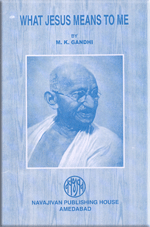
P.O. SEVAGRAM, DIST.WARDHA 442102, MS, INDIA. Phone: 91-7152-284753
FOUNDED BY MAHATMA GANDHI IN 1936
What Jesus means to Me

WHAT JESUS MEANS TO ME
Written by :
M. K. Gandhi
Compiled by :
R. K. Prabhu
Table of Contents
- My early studies in Christianity
- The Sermon on The Mount
- Why I am Not A Convert To Christianity
- Only Begotten Son of God?
- What Jesus Means To Me
- The Message of Jesus
- The Jesus I Love
- Christ - A Prince Amongst Satyagrahis
- The Greatest Economist of His Time
- Proselytization
- For Missionaries in India
- For Christian Indians
- For Christian Friends
- Value of Scriptural Texts
- Western Christianity Today
- To The Ceylonese Youth
- Some Questions And Answers
- Appendix I : Sermon on The Mount
- Appendix II : Two Favorite Christian Hymns of Gandhiji
About This Book
Written by :M. K. Gandhi
Compiled by :R. K. Prabhu
First Edition : 10,000 copies, September 1959
I.S.B.N :81-7229-387-9
Printed and Published by : Jitendra T. Desai,
Navajivan Mudranalaya,
Ahmedabad - 380 014,
India.
© Navajivan Trust, 1959
Download
Chapter-16: To The Ceylonese Youth
During his tour of Ceylon Gandhiji gave the following message to the Christian and Buddhist youth that had gathered to hear him at the Colombo Y. M. C. A.
To you,
young Ceylonese friends, I say: Do not be dazzled by the splendour that comes to
you from the West. Do not be thrown off your feet by this passing show. The
Enlightened One has told you in never-to-be-forgotten words that this little
span of life is but a passing shadow, a fleeting thing, and if you realize the
nothingness of all that appears before your eyes, the nothingness of this
material case that we see before us ever changing, then indeed there are
treasures for you up above, and there is peace for you down here, peace which
passeth all understanding, and happiness to which we are utter strangers. It
requires an amazing faith, a divine faith and surrender of all that we see
before us. What did Buddha do, and Christ do, and also Mahomed ? Theirs were
lives of self-sacrifice and renunciation. Buddha renounced every worldly
happiness, because he wanted to share with the whole world his happiness which
was to be had by men who sacrificed and suffered in search for truth. If it was
a good thing to scale the heights of Mt. Everest, sacrificing precious lives in
order to be able to go there and make some slight observations, if it was a
glorious thing to give up life after life in planting a flag in the uttermost
extremities of the earth, how much more glorious would it be to give not one
life, surrender not a million lives but a billion lives in search of the potent
and imperishable truth! So be not lifted off your feet, do not be drawn away
from the simplicity of your ancestors. A time is coming when those, who are in
the mad rush today of multiplying their wants, vainly thinking that they add to
the real substance, real knowledge of the world, will retrace their steps and
say, “What have we done?" Civilizations have come and gone, and in spite of all
our vaunted progress I am tempted to ask again and again, “To what purpose?”
Wallace, a contemporary of Darwin, has said the same thing. Fifty years of
brilliant inventions and discoveries, he has said, has not added one inch to the
moral height of mankind. So said a dreamer and visionary if you will—Tolstoy. So
said Jesus, and Buddha, and Mahomed, whose religion is being denied and
falsified in my own country today.
By all means drink deep of the fountains that are given to you in the Sermon on the
Mount, but then you will have to take sackcloth and ashes. The teaching of the
Sermon was meant for each and every one of us. You cannot serve both God and
Mammon. God the Compassionate and the Merciful, Tolerance incarnate, allows
Mammon to have his nine days' wonder. But I say to you, youths of Ceylon, fly
from that self-destroying but destructive show of Mammon.
Young India;
8-12-1927